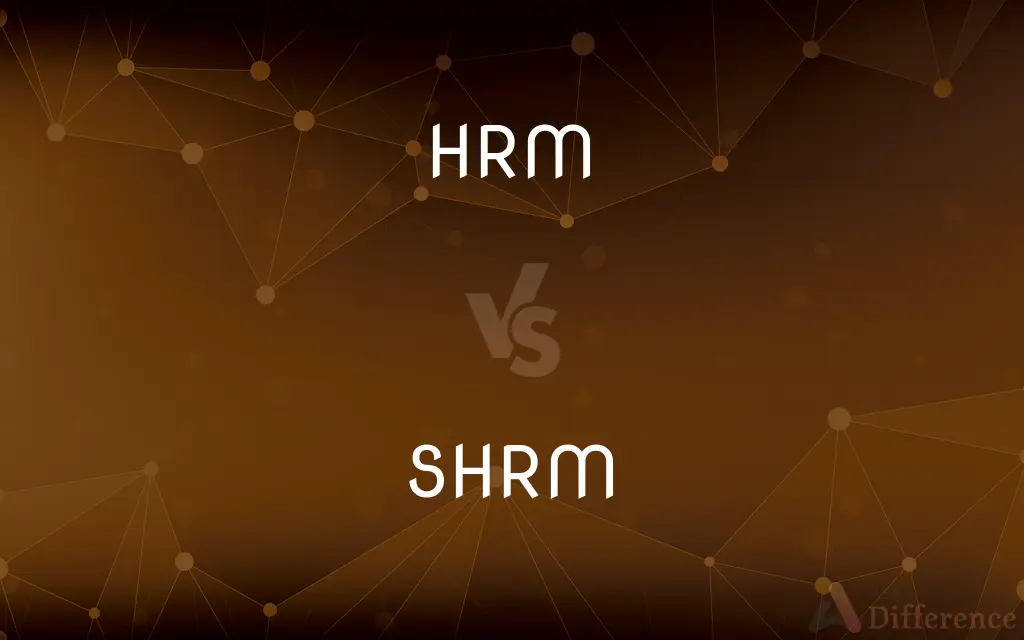HRM vs. SHRM — What's the Difference?
By Tayyaba Rehman — Published on October 6, 2023
HRM (Human Resource Management) involves managing employee functions and well-being. SHRM (Strategic Human Resource Management) aligns HRM strategies with organizational goals.

Difference Between HRM and SHRM
Table of Contents
ADVERTISEMENT
Key Differences
HRM and SHRM both navigate through the crucial pathways of managing organizational human resources, yet they diverge in approach and scope. HRM primarily focuses on employee management, concerning itself with hiring, training, and maintaining a healthy work environment. SHRM, on the other hand, embeds HRM within strategic planning, ensuring that human resource practices are in unison with organizational objectives and future aspirations.
In the realm of HRM, approaches to handling employees, administering benefits, and compliance management are crucial. Whereas SHRM meticulously carves these approaches to not only manage but also enhance and strategically place human resources as a pivotal contributor to organizational success and competitive advantage.
While HRM may often concern itself with the immediacies of employee life cycles such as recruitment, compensation, and relation, SHRM expansively integrates these functions with strategic foresights. HRM prioritizes operational facets, ensuring smooth day-to-day operations. Conversely, SHRM perceives these operations within a larger, strategic framework, ensuring each function is a step towards larger organizational milestones.
Taking a closer look at employee development, HRM emphasizes skill development, training, and performance management. SHRM, contrastingly, seeks to align the development and utilization of employee skills and talents with the strategic objectives of the organization, ensuring that learning and development are strategically oriented.
From a leadership perspective, HRM aims at managing and resolving conflicts, ensuring a positive work environment, and facilitating team coordination. SHRM steps beyond by foreseeing how leadership development and conflict resolution can be optimized and oriented to further strategic organizational objectives, thus playing a role in long-term organizational success.
ADVERTISEMENT
Comparison Chart
Focus
Operational employee management
Aligning HR practices with strategic goals
Scope
Day-to-day employee management
Integration of HR functions with organizational strategy
Objective
Efficient management of employee life cycle
Achieving organizational objectives through strategic HR
Implementation
Function-focused
Strategy-focused
Decision Making
Often decentralized
Tends to be more centralized
Compare with Definitions
HRM
The oversight of employee affairs and workplace conditions.
Through HRM, the company aims to enhance employee satisfaction and performance.
SHRM
Ensuring HR functions directly contribute to strategic business goals.
SHRM ensures that recruitment processes are synchronized with business needs and future directions.
HRM
A function focusing on employee policies, benefits, and welfare.
HRM develops policies that secure and uplift employee well-being.
SHRM
The strategic utilization and development of human resources within a business strategy.
Through SHRM, employee development programs are tailored to meet organizational objectives.
HRM
The management of an organization's workforce.
HRM ensures the effective utilization of talent within a company.
SHRM
A framework that connects HR operations with strategic organizational aims.
SHRM facilitates a direct connection between employee management and business strategy achievement.
HRM
The practice of recruiting, hiring, and managing employees.
Proper HRM is essential for maintaining a productive work environment.
SHRM
Aligning HR practices with an organization’s strategic objectives.
SHRM involves ensuring talent management contributes to achieving business goals.
HRM
A department responsible for handling personnel management and relations.
The HRM department addressed the grievances raised by the employees.
SHRM
The integration of human resource management with strategic planning.
SHRM is pivotal in ensuring the workforce is aligned with the company's future vision.
Common Curiosities
What does HRM focus on?
HRM focuses on managing the day-to-day operations and life cycle of employees within an organization.
How does SHRM enhance organizational competitiveness?
SHRM enhances competitiveness by ensuring that HR practices strategically contribute to achieving organizational goals.
Is HRM concerned with strategic planning?
HRM is primarily concerned with operational aspects of employee management, not specifically with strategic planning.
How does SHRM differ from HRM?
SHRM aligns HR practices with the strategic goals and objectives of the organization, beyond immediate HR functions.
Does SHRM involve dealing with day-to-day employee issues?
While SHRM does involve managing employee issues, it does so with a strategic, organizational objective in mind.
Is leadership development a part of HRM?
Yes, HRM encompasses leadership development focusing on immediate management needs and operational functionality.
How does SHRM influence employee development programs?
SHRM ensures employee development is in sync with and contributes to the strategic objectives of the organization.
Is employee recruitment a focus area in HRM?
Yes, employee recruitment is a crucial function of HRM, focusing on filling vacancies and managing talent acquisition.
Can HRM practices be integrated into SHRM?
Yes, SHRM essentially integrates HRM practices, ensuring they are strategically aligned with organizational objectives.
Does SHRM prioritize short-term or long-term organizational goals?
SHRM typically prioritizes long-term organizational goals, aligning HR practices to achieve them.
Can HRM influence organizational strategy?
While HRM primarily deals with operational management, its policies can indirectly influence organizational strategy.
Can a company adopt both HRM and SHRM?
Yes, HRM and SHRM can coexist, with HRM handling daily operations and SHRM ensuring alignment with strategic goals.
How does SHRM approach employee recruitment differently than HRM?
SHRM approaches recruitment with a strategic lens, ensuring it aligns with and contributes to long-term organizational goals.
Can SHRM influence the competitive advantage of an organization?
Yes, SHRM strategically aligns HR practices to support and enhance the competitive advantage of an organization.
How does HRM address employee satisfaction?
HRM addresses employee satisfaction by managing work conditions, resolving issues, and ensuring a healthy work environment.
Share Your Discovery

Previous Comparison
Dubai vs. UAE
Next Comparison
Direct Tax vs. Indirect TaxAuthor Spotlight
Written by
Tayyaba RehmanTayyaba Rehman is a distinguished writer, currently serving as a primary contributor to askdifference.com. As a researcher in semantics and etymology, Tayyaba's passion for the complexity of languages and their distinctions has found a perfect home on the platform. Tayyaba delves into the intricacies of language, distinguishing between commonly confused words and phrases, thereby providing clarity for readers worldwide.
















































